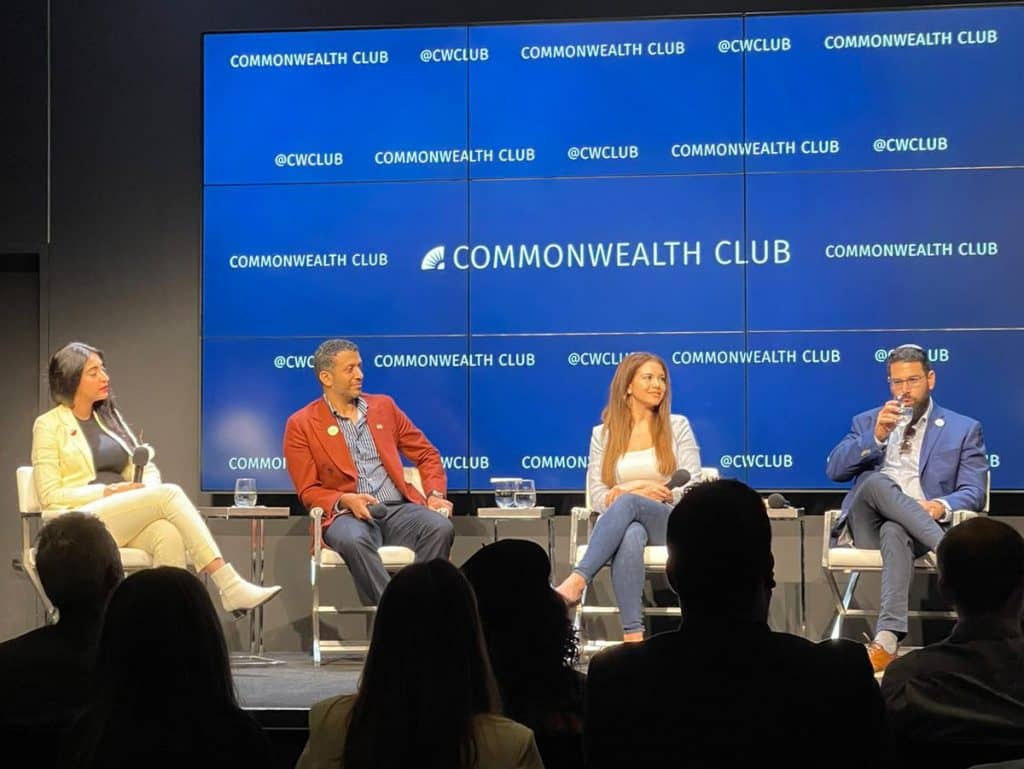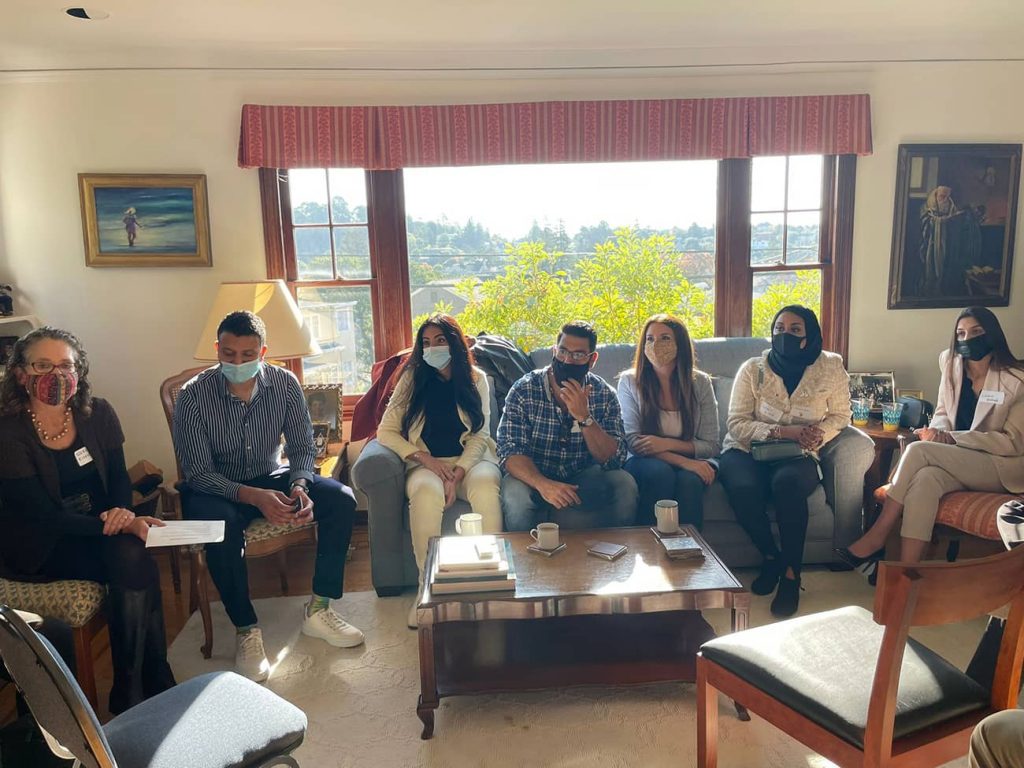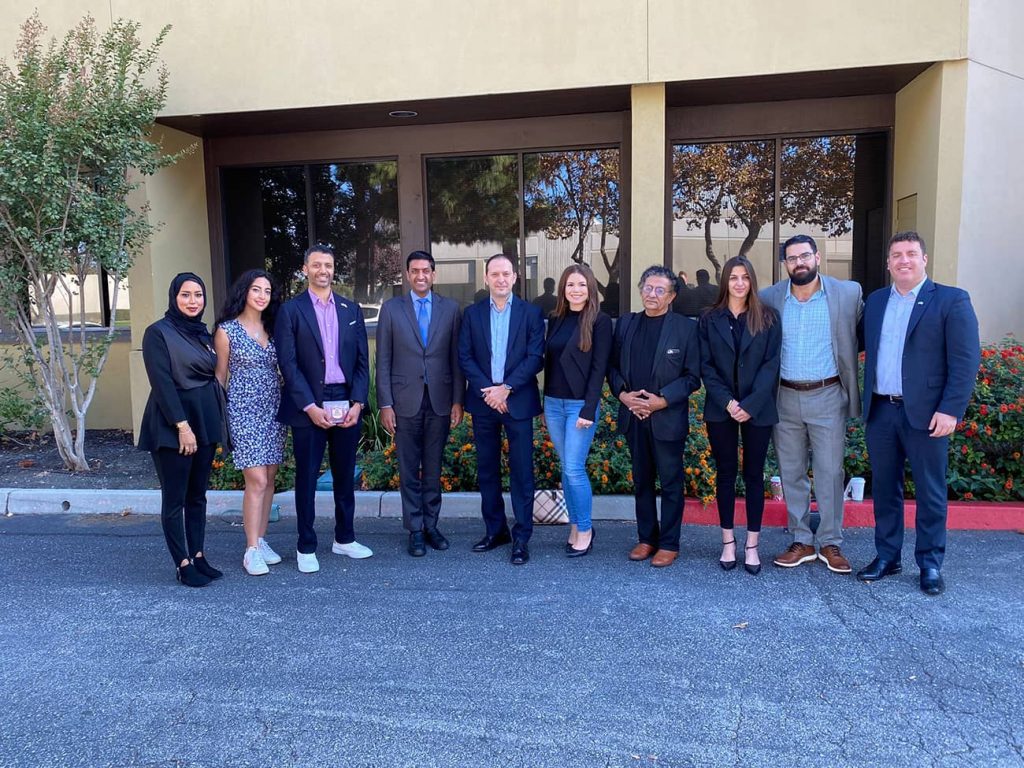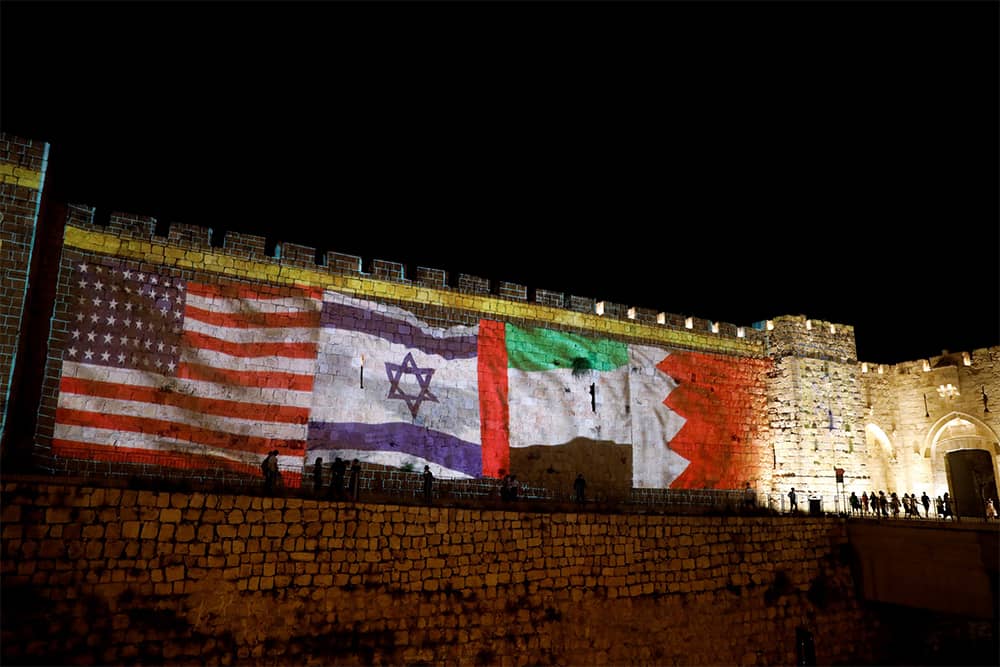I just returned from a speaking tour about the Abraham Accords in the United States. The accords were intended to bring together Abraham’s descendants—Isaac and Ishmael. But they might also help bring together the children of Isaac—that is, help mend the relations between Israel and American Jewry.
Recently I was forwarded, with great concern, a New York Times article by Marc Tracy, titled “Inside the Unraveling of American Zionism: How a New Generation of Jewish Leaders Began to Rethink Their Support for Israel.” It is a fair and balanced piece that informs of the growing divide and offers insights to the root of this.
Neither informed readers on either side of the Atlantic divide nor the readers of Nadav Tamir’s essay on the pages of the JST will be shocked to learn that younger American Jews seem to be growing more distant and more critical of Israel.
This past spring’s military conflict in Gaza between Israel and Hamas led to new and previously unheard-of levels of criticism and rage against Israel by younger American Jews, including future leaders. The most public expression of this criticism, as described by Tracy, was a letter penned by 93 rabbinical students from virtually every rabbinic seminary outside the Orthodox world. The authors, most of whom have spent considerable time in Israel and are relatively knowledgeable on its politics, chided Israel for its use of military force against the Palestinians, asking the Jewish world “to change our behavior and demand better.” They called for a rethinking of US military support for Israel and “insisted” that Jewish educators complicate their teaching of Israel’s founding to convey “the messy truth of a persecuted people searching for safety, going to a land full of meaning for the Jewish people, full of meaning for so many other peoples, and also full of human beings who didn’t ask for new neighbors.” They also made no mention of Hamas, the terror organization behind the war against Israel, and its total control of the Gaza strip.
Recently I helped to lead a speaker delegation sponsored by an NGO called Sharaka—Arabic for “partnership”—to discuss the Abraham Accords and the “new” Middle East with groups and communities across the Bay Area. Following this experience, I am convinced that the Abraham Accords—Israel’s new relationships with the Gulf States, Sudan, and Morocco—can offer a framework to heal not only the Middle East divides and conflicts but also the growing divide between Israel and American Jewry.
Sharaka is a non-profit, non-political, and non-governmental organization founded by young leaders from Israel and the Arab Gulf after the signing of the Abraham Accords. (Full disclosure, the author is an employee of Sharaka.) Sharaka’s goal is to translate the diplomatic agreements to the people’s level and promote the concept of the Abraham Accords to the broader Arab and Muslim world. The delegation was composed of young people from the UAE, Bahrain, Morocco, Syria, and Israel.
We met with Jewish communities (synagogues of all denominations, Jewish federations, Jewish community centers, Jewish political clubs)—the vast majority on the liberal side of the political map. We met with Democratic Party activists, progressive politicians, university students, civic society leaders, intellectuals, and prominent businesspeople. In each appearance, we spoke of a new Middle East, one in which the region is increasingly divided into the Abraham Accords countries—those who wish to work together, for the betterment of all—and the radical, backward, reactionary camp, who wish to bring the region down, or rather back to its darker days. The Abraham Accords, we explained, were providing the conceptual framework for the fundamental restructuring of the region.
Many in the Middle East, especially the younger generation, view Israel less and less as the problem but rather as part of a solution to the region’s troubles. This is based on many personal conversations with Arabs and Muslims over the past 18 months on multiple trips to the Gulf, as well as with friends and colleagues in Sharaka and beyond. But don’t take our word. Public opinion polls of the Arab world are also telling in this regard. Various polls and the phrasing of questions reveals different degrees of positive answers to this sentiment. Thus, according to a survey of Saudis by the Washington Institute, 41% felt the Abraham Accords were positive, while 37% agreed that those who wish to do business with Israel should be allowed to do so. A survey of 8000 adults in eight Arab countries conducted in 2019 by Zogby Research Services found that 70% felt it “was desirable that some Arab states will develop normalized relations with Israel, even without peace between Israel and the Palestinians.” However, it is worth considering that other recent studies, such as the Arab Barometer, found that 88% across the Arab world opposed diplomatic recognition of Israel. Similarly, a high number across the Arab world still view Israel as the biggest state threat to Arab countries.
The lack of consistency across polls makes it hard to get a clear answer. And yet, what is interesting and clear, as can be seen in an analysis by David Patrikarakos, is what happens when you compare the same polls across years. In this manner, the Arab Opinion Index shows a significant drop of those viewing Israel as the greatest threat and an increase in those viewing Iran as such. The Zogby poll showed, according to Patrikarakos, a massive increase in Egyptians ready for peace with Israel (should the Palestinian issue be resolved), as well as in Saudi Arabia. The statistic of 37% from the Washington Institute is “quadruple” the number who agreed with doing business with Israel just before the accords. David Pollock, a fellow at the Washington Institute, commented that “the rapid growth demonstrates that popular attitudes on this supposedly sensitive point are actually quite fluid, probably responding both to new events and official guidance.”
These voices among the people of the Middle East and, increasingly, most of its governments understand that the Israeli–Palestinian conflict has been long dragged out and blown out of proportion, and it can no longer be blamed for a host of regional challenges. They understand that the Palestinians have responsibility and agency for solving the conflict as well. They are not entirely convinced that they should hold back their own national interests due to the unsolvable Palestinian issue. And, they also believe that perhaps positive engagement with Israel could actually help solve the unsolvable challenge where boycotts and demonization did not.
The people of the Middle East and most of its governments increasingly are aware of bigger challenges—such as climate change, sustainability, food and water security, education, and employment—in which Israel has too much to offer to be ignored. The Middle East increasingly sees that Israel’s military might be used to keep Iran and its radical proxies in check and is not the bogeyman they were taught to fear. The same Middle East saw what Iran and its proxies have done to other Arabs and Muslims in Iraq, Syria, Lebanon, and Yemen. They have come to understand that Israel has little-to-nothing to do with these conflicts. Some even saw that while Iran, Syria, Hezbollah, and ISIS were massacring Muslim Arabs, Kurds, Yazidis, and others, Israel was quietly helping wounded Syrians on its border.
In each presentation, we offered a message of hope. In each panel, we urged Americans to leave their domestic, partisan political lenses aside when approaching the Middle East. We found that too many Americans were unaware of the Abraham Accords and their positive and transformative regional influence. Those Americans who were aware perceived the accords with a measure of insincerity because of their own domestic political positions. Many were simply not aware of how the region was changing because Western media tends to be stuck in old paradigms about the Middle East that are fixated on conflict and place the Palestinian issue at the heart of everything. American Democrats, and most American Jews we met, seemed unable, at least initially, to break out of this paradigmatic thinking. For too long, they had been trained to discuss Israel only in the context of the Palestinian conflict.



Of course, in every panel presentation, someone predictably asked if the Abraham Accords were not a cynical way to ignore and bury the Palestinian conflict. It is a fair question. They asked if the accords were not essentially a business-deal masked as “peace” by the political leaders who orchestrated them. After all, Israel was never at war with these states.
Each of us, in our own way and from our own national and regional perspective, did not deny the economic benefits enjoyed by the signatory states and nor should we. Deepening and broadening economic ties can be a lynchpin of peace and coexistence. Nor did each of us, in our own way, skirt the Palestinian question. What was clear to the Emiratis, Bahrainis, Moroccans, and even the Israelis was that seven decades of boycotting Israel had not worked.
As the lone Israeli Jew on the panel, I answered to one such audience member that had the Arab world’s past strategy been successful—of boycotting Israel until the Palestinian issue has been resolved—I would have understood entirely what drove this approach. Each in our own way said that we all wish to see the Israeli–Palestinian conflict resolved, but that the reigning paradigm of the past seven decades simply did not work. If anything, it only caused the Palestinians to forgo compromise and dig in their heels. After all, the Arab world backs them, and this, in turn, causes Israelis to dig in on our own positions.
The Emirati, Bahraini, and Moroccan speakers stressed that the Abraham Accords could help their countries become more positively engaged in resolving the conflict, by having friendly relations with both sides and not just one. We all emphasized our sincere hope that the regional-first paradigm will succeed where the Palestinian-first paradigm continuously has failed. I am entirely hopeful that through a regional-first paradigm, with the encouragement and support of the broader region, the Palestinians will increasingly view Israel more positively, and that Israelis will also see the Palestinians more positively; after all, most Israelis do not have regular, positive contact with Palestinians. Unfortunately, what we do see are the terrorists, the extremists, and their supporters. With so many Israelis now travelling to the Arab world and positively engaging with Arabs and Muslims, the region-first approach can create the necessary conditions to later solve the Israeli-Palestinian conflict after it has been reduced to its true proportions.
Our message seems to have resonated. The responses we received after each presentation was a teary-eyed round of applause. “We had no idea,” we heard from virtually everyone we met, and “Just when we had so little hope regarding Israel and the Middle East, you gave us hope.”
Now back to Tracy’s New York Times piece.
One of the key reasons behind this growing divide between Israel and American Jewry, as Tracy correctly points out, is a generational issue. American Jews under 30 only know of a right-wing Israel, led by a nationalistic Benjamin Netanyahu, a self-confident settler movement, and near constant military campaigns against Hamas in Gaza. American Jews under 30 hardly recall a time when Israel made far-reaching peace offers to its Palestinian neighbors, or that those offers were rejected and met with violence and extremism in the forms of the Second Intifada, or Hamas’s takeover of Gaza after the disengagement. They don’t recall Shimon Peres or Yitzhak Rabin, Ehud Barak, or even an older, reformed Ariel Sharon—whose efforts were rejected by the Palestinians time and again.
What is less understood is that, in large part, Israeli society’s disillusionment with failed peace attempts drove many to the right. By contrast, American Jews under 30 hardly remember an Israel that extended its hand in peace, or that ever seemed vulnerable; rather, they only know one that is militarily dominant. They also hardly remember a time when Jews seemed vulnerable or unaccepted as a minority in the US.
As Tracy’s article also correctly points out, many young American Jews critical of Israel consistently try to place a very American-centric racial-structural framework on highly complicated but unrelated issues taking place in the Middle East. “American Jews have been part of a racial reckoning in our community,” they said. “And yet,” they added, “so many of those same institutions are silent when abuse of power and racist violence erupts in Israel and Palestine.”
Responding to this letter, Rabbis Bradley Shavit Artson, dean of the Ziegler School of Rabbinic Studies, and Sharon Cohen Anisfeld, president of Hebrew College, felt the need to speak out, suggesting that what the young generation of critics seems to lack is ahavat Yisrael, a “love of Israel.” Said otherwise, it seems that young American Jews lack empathy toward Israel and their Israeli brethren.
Israel of the past decade is viewed, rightly or wrongly, as one that does not seek out peace. Perhaps the opposite; it seemed as if it was actively working to bury the chances for peace with the Palestinians through settlement expansion and aggressive and often nationalistic rhetoric. This is a view that meshes well with the racial-structural framework through which American Jews and young Americans more broadly view the world.
Essentially, American Jews increasingly came to view Israelis as aggressors and oppressors, and as the dominant side of a structural imbalance, when, in fact, Israeli Jews are also victims. This might not be outwardly evident from the militant rhetoric voiced by right-wing Israelis, but it should be clear to anyone who is listening, with empathy.
To be fair, the past decade or more of Israeli history has not given Israelis too much of a chance to seek peace. The Palestinian Authority maintains constant diplomatic attacks while supporting a culture of terrorism. Terror attacks are a mainstay of daily life in East Jerusalem, the Old City, and Judea and Samaria. Gaza, overrun by extremist groups like Hamas and Islamic Jihad, became a launching-pad for rockets and other terror campaigns. Israel’s shift rightward, if American Jews are really listening, is an expression of a sense of genuine threat.
Let’s be honest: American Jews over 30, and especially over 40, hold many of the same critiques of Israel as do their younger counterparts. They are critical of the settlement enterprise and Israel’s policies regarding the Palestinians. They seek religious equality for the liberal Jewish streams and secular Jews and chafe at the control of the Orthodox Chief Rabbinate over religious institutions. They support the left-leaning NGOs that Netanyahu’s governments sought to limit and censor. They also took offense and expressed outrage at Netanyahu and the Israeli right’s seemingly choosing the Republican Party of Donald Trump and the Evangelicals over the Democratic Party.
They held and continue to hold these critical positions while supporting Israel in its time of need. They certainly held their criticisms in check while rockets fell on Israel. They showed empathy; they showed ahavat Yisrael, which younger American Jews seem to be lacking. Why would the previous generation be more empathetic to Israel than the younger one?
Here’s a theory: The Abraham Accords present us with a unique moment in the modern history of the Middle East. They offer the chance for a true realignment and the expansion of peaceful and warm relations between Israel and much of the region. Even young Arabs and Muslims across the region in countries that have yet to normalize are starting to view Israel in this new light and reaching out to me and my colleagues on a daily basis to offer their support.
The Abraham Accords are, of course, not intended for an American audience. They are, first and foremost, intended to positively transform the Middle East. Yet one major and unintended benefit can be healing this growing divide between American Jewry and Israel by reminding American Jews that Israelis truly desire peace with their neighbors, so much that their Arab neighbors are recognizing this, one by one.
If we can put aside domestic partisan politics and outdated paradigms, as did the audiences who met the Sharaka delegation, perhaps these accords can have another positive contribution—they bring together not just the children of Isaac and Ishmael but also the descendants of Isaac with one another.

